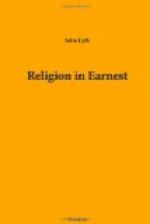’Yea the sparrow hath found an house,
And the swallow a nest for
herself,
Where she may lay her young;
Even thine altars, O Lord
of Hosts,
My King and my God.’
Mrs. Lyth loved the habitation of the Lord’s house, and deprecated the prospect of separation from its privileges, which was rendered extremely probable by her increasing weakness. Eastfield House was about a mile from the village, and between three and four from York. In case of decided failure of health, she would not only have been cut off from active usefulness in which she delighted, but entirely excluded from christian ordinances. With the view of a little relief, she had already relinquished one of her classes in the city, and turned her attention more exclusively to the village; but now there was every likelihood that she must soon give up the other. These circumstances, with some others of less moment, determined the propriety of a removal back to York. Shortly before this took place, in one of her walks thither, for the purpose of meeting her class, a circumstance transpired which is worth relating. She met on the road an odd old man, whose extraordinary appearance made him, at that time, well known in York and its vicinity. At one time above the average stature, he was now bent nearly double with age, and hobbled along with two sticks. A huge bunch of the old fashioned matches, attached by a string to his neck, hung down before him, and was sufficient sign of his occupation; while a long white beard, reaching well nigh to the ground, completed the singularity of his appearance. This latter appendage was, however, conveniently made to take off and on at pleasure. He was fabulously reported to be a hundred and twenty years old; and there was little doubt that he, and also his wife who sometimes accompanied him, were on the eve of celebrating their centenary, if they had not already done so. When Mrs. Lyth met him, she was strongly impelled to speak to him on the subject of religion; but being alone, and a little timid, she passed on. When she had proceeded about a hundred yards, she felt so much pained with the omission of her duty, that she hastened back, and faithfully discharged her conscience. We need only add, that the old man and his wife began to attend the chapel, and ultimately became members of Mr. Lyth’s class. The old man got rid of his beard and his sins together, and, about two or three years later, both died in the hope of eternal life.
“1834.—Able to go to the village. Called to see Mrs. B., who seems to have a desire to be saved, but has to contend with great affliction. Another proof of the importance of seeking the Lord in health. Poor old Mrs. L. is much altered, and did not recollect me. So mutable and perishing is man. On reviewing the day, I think I have been aiming to please God; but my performances are so poor, that I have need to humble myself before God.—I got to see Mrs. R., most probably for the last time.




